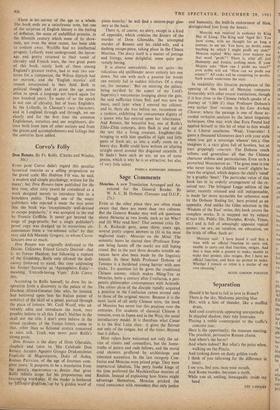Corvo's Folly
Don Renato. By Fr. Rolfe. (Chatto and Windus, 30s.) , EVEN poor Corvo didn't regard this peculiar historical exercise as a selling proposition on the grand scale. His Hadrian VII was, he said, 'a modern and simple psychology, written for the many'; but Don Renato (now published for the first time, after sixty years) he considered as a work designed merely to introduce him to a breathless public. Though one of the, many publishers who rejected it made the nice point that the book was 'exceptionally well-devised to escape popularity,' it was accepted in the end by Francis Griffiths. It never got beyond the stage of page-proofs; but a single publisher's proof copy was dredged up in mysterious cir- cumstances from; a 'rat-infested cellar' by that very odd fish Maundy Gregory, to whom Corvo- fanciers owe so much.
Don Renato was originally dedicated to the Divine, Unknown Friend Greatly Desired—that is to Trevor Haddon; but following a rupture of the friendship, Rolfe only allowed the dedi- catory foreword to stand, this time addressing his former favourite as 'Apistophilos Echis.— meaning, 'Untruth-loving Viper.' Echt Corvo, this.
According to Rolfe himself, he drew his in- spiration from a discovery in the palace of the Duchess Sforza-Cesarini (she who, he insisted, had bestowed upon him his Italian patent of nobility) of the skUll of a priest, pierced through the place of tonsure. Mr. Cecil Woolf, who ad- mirably edits and introduces the book, may possibly believe in all this. I don't. Neither in the skull nor the title. I don't even believe in the sexual incidents of the Venice letters, come to that, other than as fictional erotica conceived as sales talk. Truth was never poor Rolfe's strong point.
Don Renato is the diary of Dom Gheraldo, chaplain and tutor to 'His Celsitude Don Renato Ascanio Agapito Giorgio Drakontoletes Poplicola di Hagiostayros, Duke of Ardea, Roman Patrician, of the age of fourteen com- plete years.' It purports to be a translation from the priests macaronics—a device that gives Rolfe infinite scope for his preposterous and fascinating word-play. If the reader is bothered by "cfllenate gingilism,' or by 'a golden woof of pious tenerity,' he will find a sixteen-page glos- sary at the back.
There is, of course, no story, except in a kind of appendix, 'which contains the history of the murder of Dom Gheraldo, the attempted murder of Renato and his child-wife, and a dashing escape-piece, taking place in the Cloaca Maxima. The diary itself is a matter of jottings and listings, some delightful, some quite per- versely boring.
It is almost unreadable, but not quite—the ridiculous old spellbinder never entirely lets one down. No one with such a passion for words can entirely fail in sudden felicities. Of a stray cat, for instance: 'But on entering the palace, being terrified by the aspect of my Lord's Supernity's mercenaries lounging about the gate, the said sufflavian kitten fled; and was seen no more, until later when I entered my cabinet; and lo, there she was before me, recumbent on a cushion, exhibiting the consummate dignity of a queen who has entered upon her inheritance.' And Renato, the beautiful boy, one of Rolfe's Zildo-Zilda concepts, does flash in and out of the text like a living creature, kingfisher-like bringing in with him sparkles of light and little gusts of fresh air, as into, a stuffy room on a heavy day. Rolfe could have written an alluring straight novel around this disguised catamite, if he hadn't been such an ass; an ass of some genius, which is why he is so attractive; but alas, of very little talent.
PAMELA HANSFORD JOHNSON






























 Previous page
Previous page